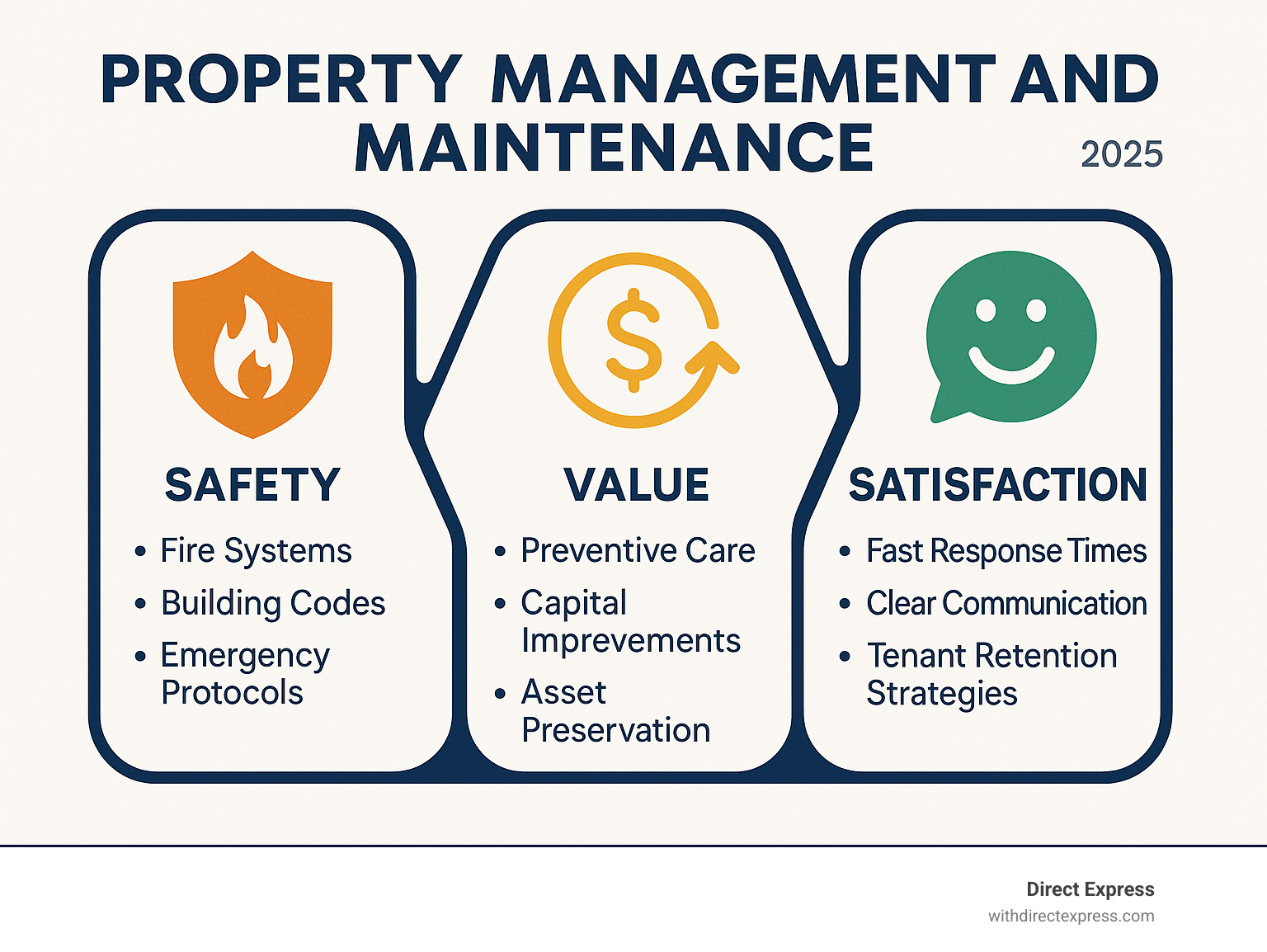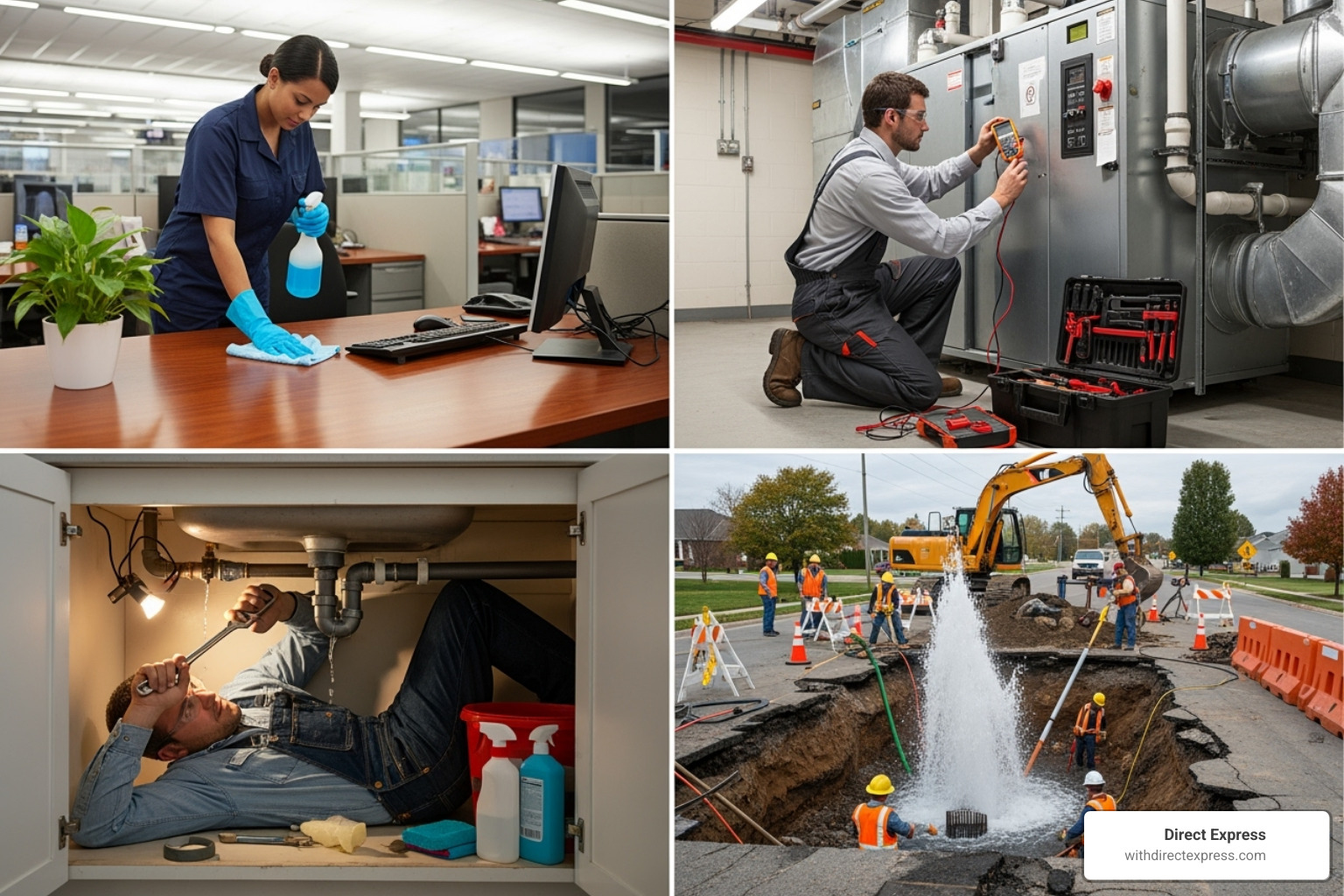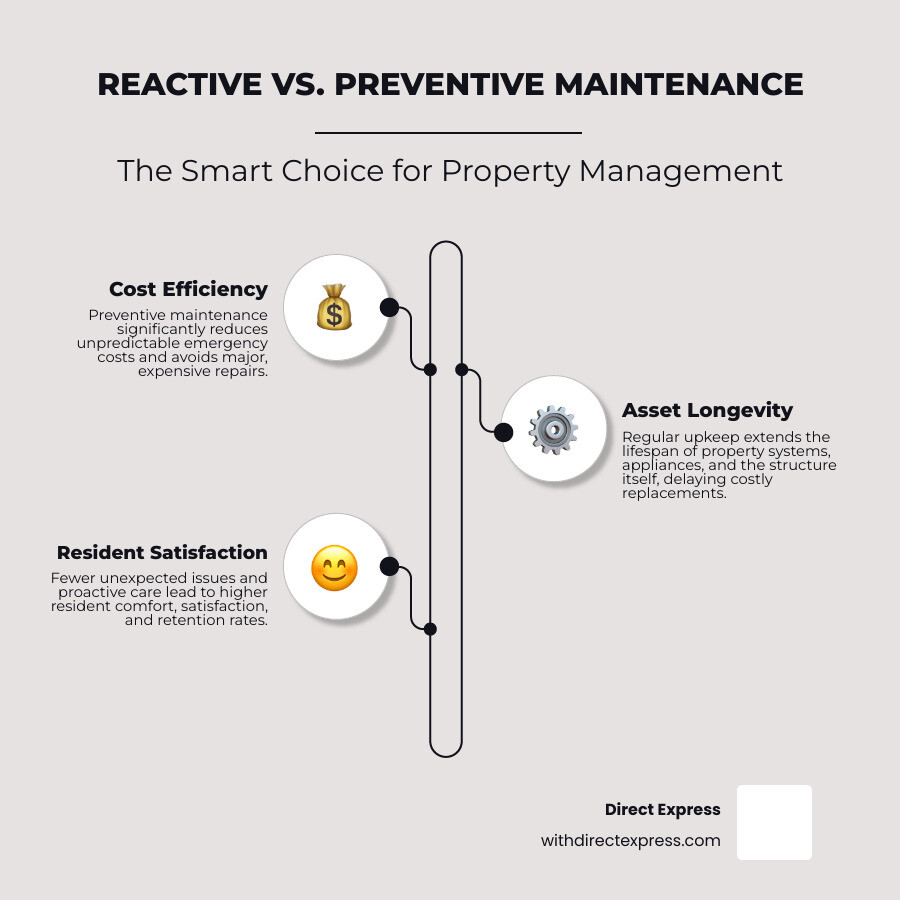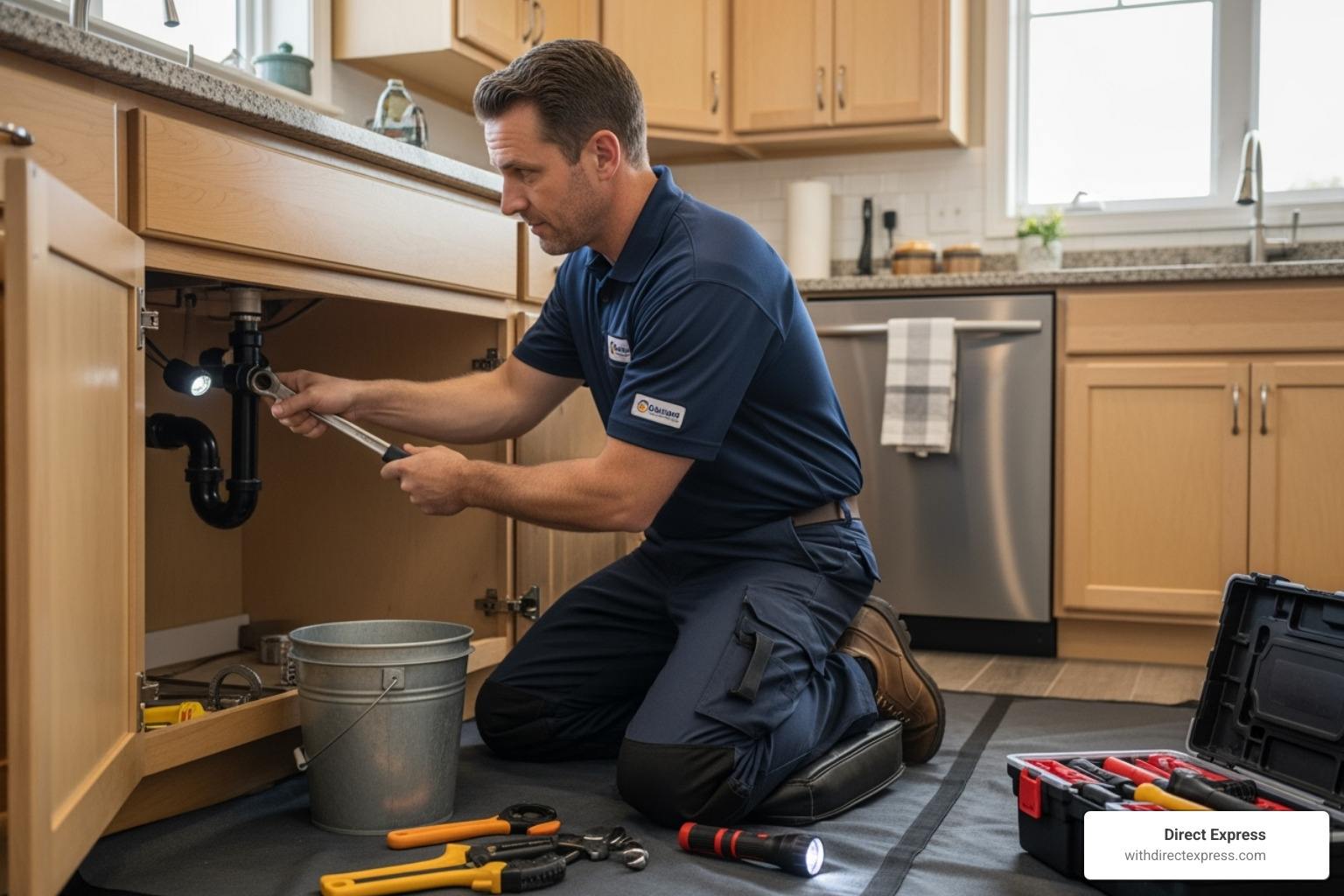Why Property Management and Maintenance is Essential for Your Investment Success
Property management and maintenance is the cornerstone of successful real estate investing, encompassing everything from routine upkeep to emergency repairs that keep your properties profitable and tenants satisfied. Whether you’re managing a single rental or an entire portfolio, understanding these core responsibilities can make the difference between a thriving investment and a costly headache.
Key Elements of Property Management and Maintenance:
- Preventive Maintenance – Regular inspections, HVAC servicing, and scheduled repairs
- Reactive Maintenance – Emergency fixes like plumbing leaks or electrical issues
- Tenant Relations – Fast response times and clear communication channels
- Legal Compliance – Meeting habitability standards and building codes
- Financial Management – Budgeting 1-2% of property value annually for upkeep
The numbers tell the story: properties with proactive maintenance strategies see a 38% reduction in HVAC-related service requests when simple preventive measures like air filter delivery are implemented. More importantly, 78% of prospective residents say online reviews about maintenance responsiveness are their top factor when choosing where to live.
“Property maintenance is one of the most important parts of the resident experience. But it’s also costly and difficult to control,” according to industry research. This challenge becomes even more complex when you consider that maintenance issues don’t keep regular business hours – emergencies can strike at any time.
The key is building systems that balance cost control with tenant satisfaction while protecting your long-term investment value. From managing vendor relationships to leveraging technology for faster response times, successful property maintenance requires both strategic planning and operational excellence.
I’m Joseph Cavaleri, CEO of Direct Express Rentals with over two decades of experience in property management and maintenance across residential and commercial properties throughout Florida. Through Direct Express, I’ve helped countless property owners streamline their maintenance operations while maximizing tenant satisfaction and investment returns.

The Foundation: Understanding Property Maintenance and Its Core Components
Think of property management and maintenance as the heart of your real estate investment. Without it, a beautiful property can become a costly nightmare. With the right approach, it’s the foundation that keeps your investment thriving.
What is Property Maintenance and Why is it Crucial?
Property maintenance is the ongoing care your property needs to stay safe, functional, and attractive. It’s not just about fixing what’s broken; it’s about asset preservation and protecting your investment. Good maintenance preserves the value you’ve worked hard to build.
Property upkeep directly impacts your bottom line. Well-maintained properties attract better tenants who stay longer, reducing turnover and vacancy costs. They also command higher rents and maintain their value over time.
Crucially, proper maintenance ensures habitability and resident safety. Property owners have legal and moral obligations to provide safe, livable spaces. This isn’t just good business—it’s the right thing to do.
The link between maintenance and return on investment is clear. A small, ignored roof leak can lead to thousands in water damage. A few hundred dollars in annual HVAC maintenance can prevent a system replacement costing thousands.
If you’re just starting your property investment journey, understanding these fundamentals is crucial. Our Beginner’s Guide to Property Management covers these essential concepts in detail.
The Four Types of Property Maintenance

Understanding the different types of maintenance helps you plan and allocate resources effectively. Here are the four main categories every property owner should know:
- Routine maintenance includes regular, predictable tasks like changing air filters, cleaning common areas, and basic landscaping. These seasonal tasks keep your property looking professional.
- Preventive maintenance is a proactive approach to catch problems before they become expensive disasters. This includes annual HVAC tune-ups, gutter cleaning, and checking for small leaks during inspections. It’s a small investment that prevents major headaches.
- Reactive maintenance, or corrective maintenance, is the “fix it when it breaks” approach. While preventive measures reduce this, some repairs are inevitable. The key is a quick response to minimize damage and keep tenants happy.
- Emergency maintenance covers urgent situations that threaten safety or could cause significant property damage, like burst pipes or electrical failures. A 24/7 emergency response plan is essential.
Core Services in Property Management and Maintenance
Comprehensive property management and maintenance covers a wide range of services that keep your property competitive and profitable.
- HVAC servicing is critical in Florida’s climate, where a broken AC is an emergency. Regular maintenance ensures efficiency and helps avoid costly summer breakdowns.
- Plumbing services are another key component. Water issues can escalate quickly, so having reliable Plumbing Services on call protects your property and tenants’ belongings.
- Electrical repairs ensure safety and functionality. Outdated systems can be hazardous, and modern tenants require reliable power.
- Landscaping is a powerful tool for tenant retention and property value, creating a crucial first impression and contributing to resident satisfaction.
- Pest control is essential in Florida’s warm climate. Regular treatments prevent infestations that could damage your property’s reputation.
- Common area cleaning and regular inspections are also vital. Clean common areas boost tenant satisfaction, while inspections help catch issues early.
- Capital improvements are strategic investments like kitchen upgrades or new flooring that increase property value, attract quality tenants, and justify higher rents.
Building a Winning Property Management and Maintenance Strategy
A successful property management and maintenance strategy is about preventing fires, not just putting them out. The best strategies combine smart planning, the right people, modern technology, and careful financial oversight.
The Proactive Approach: Benefits of Preventive Maintenance
Preventive maintenance is one of the most profitable investments you can make in your property. The numbers speak for themselves: properties with simple preventive measures, like regular HVAC filter delivery, see a 38% reduction in HVAC-related service requests. This means real money saved and happier tenants.
Cost reduction occurs by catching small issues before they become expensive disasters. A $50 filter replacement can prevent a $5,000 HVAC system failure. Asset longevity also improves dramatically when equipment receives regular care.
A key benefit is fewer emergencies. Proactive maintenance means fixing potential problems during business hours, not in the middle of the night. This leads to increased efficiency, as your team can plan work instead of reacting to crises. Residents experience fewer disruptions and appreciate the well-maintained property.
This boosts resident satisfaction. Happy tenants stay longer, refer friends, and take better care of your property, creating a positive cycle.

Assembling Your A-Team: Hiring and Managing Staff
Your property management and maintenance team is the heartbeat of your operation. Whether you choose an in-house team or outsource, you need people with the right mix of technical skills and attitude.
Technical expertise is crucial. Look for experience with HVAC, electrical, and plumbing systems. Certifications like the Certificate for Apartment Maintenance Technicians (CAMT) show a commitment to the profession. Don’t overlook soft skills like communication and customer service, as your team is the face of your property.
Salary expectations vary by role and location, with technicians typically earning $30,000-$40,000, supervisors $40,000-$70,000, and property managers $50,000-$80,000 annually.
The in-house versus outsourcing decision is about control versus convenience. An in-house team offers direct oversight and faster response but requires managing payroll and benefits. Outsourcing reduces your management burden and provides specialized expertise but offers less direct control. Choose the model that best fits your needs.

Leveraging Technology for Streamlined Operations
Technology has transformed property management and maintenance, replacing paperwork and phone calls with seamless integrated platforms.
Maintenance software is essential for staying competitive. It provides a central hub for residents to submit requests, for your team to track progress, and for you to monitor operations in real-time. Features like online maintenance requests, work order tracking, and automated communication improve accuracy and keep everyone informed.
Mobile inspections are a game-changer, allowing your team to conduct walkthroughs with tablets or phones, with photos and notes syncing instantly to your system. Modern maintenance software integrations connect all these functions, reducing manual work and errors.
Mastering the Budget: Financial Planning for Maintenance
Smart financial planning is crucial for handling inevitable property management and maintenance costs. The 1% rule is a good starting point: budget 1-2% of your property’s value for annual maintenance. In Florida, this might increase to 1.5-3% for properties with pools or older systems.
For multi-family properties, the 30-35% rule suggests allocating 30-35% of gross rental income to all operating expenses, including maintenance. The key is to treat maintenance as a fixed expense, setting aside money monthly into a dedicated reserve account.
Tracking expenses helps you forecast future costs accurately. Vendor negotiations and competitive bidding also control costs. We build relationships with licensed, insured contractors for fair pricing. For major projects, our Construction Progress Monitoring Services ensure you get the best value while maintaining high standards.
The Payoff: Maximizing Value and Ensuring Compliance
This is where your hard work in property management and maintenance pays real dividends, rippling through every aspect of your investment.
How Great Maintenance Boosts Resident Satisfaction and Retention
The speed of maintenance response is the biggest indicator of resident satisfaction. It’s not fancy amenities but how quickly you fix a leaky faucet or restore AC on a hot Florida day that keeps tenants happy. When something breaks, residents feel vulnerable and count on you for a fast resolution.
Speed alone isn’t enough. Clear communication is key. Keep residents informed about when you’ll arrive, what you’re doing, and how long it might take. This transforms a frustrating experience into a positive one.
Consider that 78% of prospective residents check online reviews before choosing where to live, and these reviews often focus on maintenance responsiveness. When residents feel heard and see issues resolved quickly, they become your best marketing team.

A simple 3-minute check-in after repairs shows you care about their experience, not just the work order. This small gesture can make the difference in a tenant renewing their lease. Satisfied residents mean fewer turnovers, lower vacancy rates, and reduced marketing costs—a cycle that protects your investment.
Legal and Safety in Property Management and Maintenance
Staying compliant with legal requirements is a critical part of property management and maintenance. It’s about meeting your legal obligations and keeping everyone safe.
- Landlord-tenant laws define your responsibilities, including what you must provide and how quickly you must respond. Non-compliance can lead to fines or lawsuits.
- Habitability standards ensure your properties are safe and livable, with working plumbing, heating, and electrical systems. These standards protect both you and your residents.
- Building codes and fire safety regulations are detailed and mandatory. This includes working smoke detectors, fire extinguishers, and accessible common areas. The International Property Maintenance Code (IPMC) provides a common framework.
- Lead-based paint regulations apply to properties built before 1978, requiring specific procedures during maintenance.
- Insurance requirements are your financial safety net, shielding your investment from damage and liability claims.
In Florida, from Tampa Bay to St. Petersburg, we stay on top of these regulations so you don’t have to. Our team understands local requirements and keeps your properties compliant, giving you peace of mind.
Frequently Asked Questions about Property Management and Maintenance
Over the years, we’ve heard many questions about property management and maintenance. These are the most common concerns we hear from both new and experienced property owners.
What are the most common maintenance challenges for property managers?
The biggest challenge is prioritizing tasks when everything seems urgent. Managing resident expectations is also tricky, as everyone wants their issue fixed immediately. Clear, honest communication is key. Then there are the dreaded after-hours emergencies, which require a solid 24/7 system. Balancing costs with quality and finding reliable vendors are also constant challenges that require building a network of trusted, licensed contractors.
How do seasonal changes affect maintenance needs?
Florida’s seasons directly impact your property management and maintenance schedule. Each season has its own to-do list:
- Spring: Check roofs and gutters for storm damage, power-wash exteriors, and prep HVAC systems for summer.
- Summer: Focus on AC servicing and filter changes, manage increased pest activity, and maintain landscaping in the heat.
- Fall: Clear gutters, check heating systems, and prepare for potential storm cleanup.
- Winter: Ensure heating systems work for occasional cold snaps and stay prepared for any weather-related issues.
What is the difference between property maintenance and facility maintenance?
This is a great question. The main difference is who occupies the space.
Property maintenance focuses on tenant-occupied spaces like apartment complexes or rental homes. The goal is to keep the property in great shape for the owner while ensuring tenants are happy and comfortable. This is our specialty at Direct Express.
Facility maintenance deals with owner-occupied properties such as corporate headquarters, factories, or schools. The maintenance team keeps the facility running smoothly for the people who own and operate it.
Both are important, but property maintenance places a greater emphasis on tenant satisfaction and retention, which is central to our integrated approach.
Conclusion
When you step back and look at the big picture, effective property management and maintenance really is the secret sauce that transforms a good real estate investment into a great one. It’s not just about having someone on call to fix a leaky faucet – though that’s certainly important too!
What we’ve finded over our years in the business is that the most successful property owners understand this fundamental truth: maintenance isn’t an expense, it’s an investment. Every dollar you spend on preventive care, every hour you invest in building strong vendor relationships, and every system you put in place to streamline operations pays dividends in ways that might surprise you.
Think about it – when your properties are well-maintained, tenant satisfaction naturally follows. Happy tenants stay longer, which means less turnover, fewer vacancy periods, and more consistent cash flow. Your asset preservation efforts today prevent those heart-stopping emergency repair bills tomorrow. And perhaps most importantly, you get to sleep better at night knowing your investment is protected.
The beauty of having integrated services under one roof is that everything works together seamlessly. When your property management team can coordinate directly with construction crews for capital improvements, or when your maintenance requests can be handled by the same company that helped you buy the property in the first place, the entire process becomes so much smoother.
We’ve seen how this approach creates long-term value for our clients across St. Petersburg, Tampa Bay, Palm Harbor, Lutz, Wesley Chapel, Tampa, Largo, and Parrish. Whether you’re a first-time investor or managing a growing portfolio, having a trusted partner who understands every aspect of the real estate journey – from that initial purchase through years of successful property management – gives you the peace of mind to focus on what matters most to you.
At Direct Express, we’re proud to offer this comprehensive approach through our full-service Property Management alongside our buying, selling, construction, and plumbing services. Because at the end of the day, successful property management and maintenance isn’t just about managing properties – it’s about helping you build the future you’ve envisioned for yourself and your investments.









